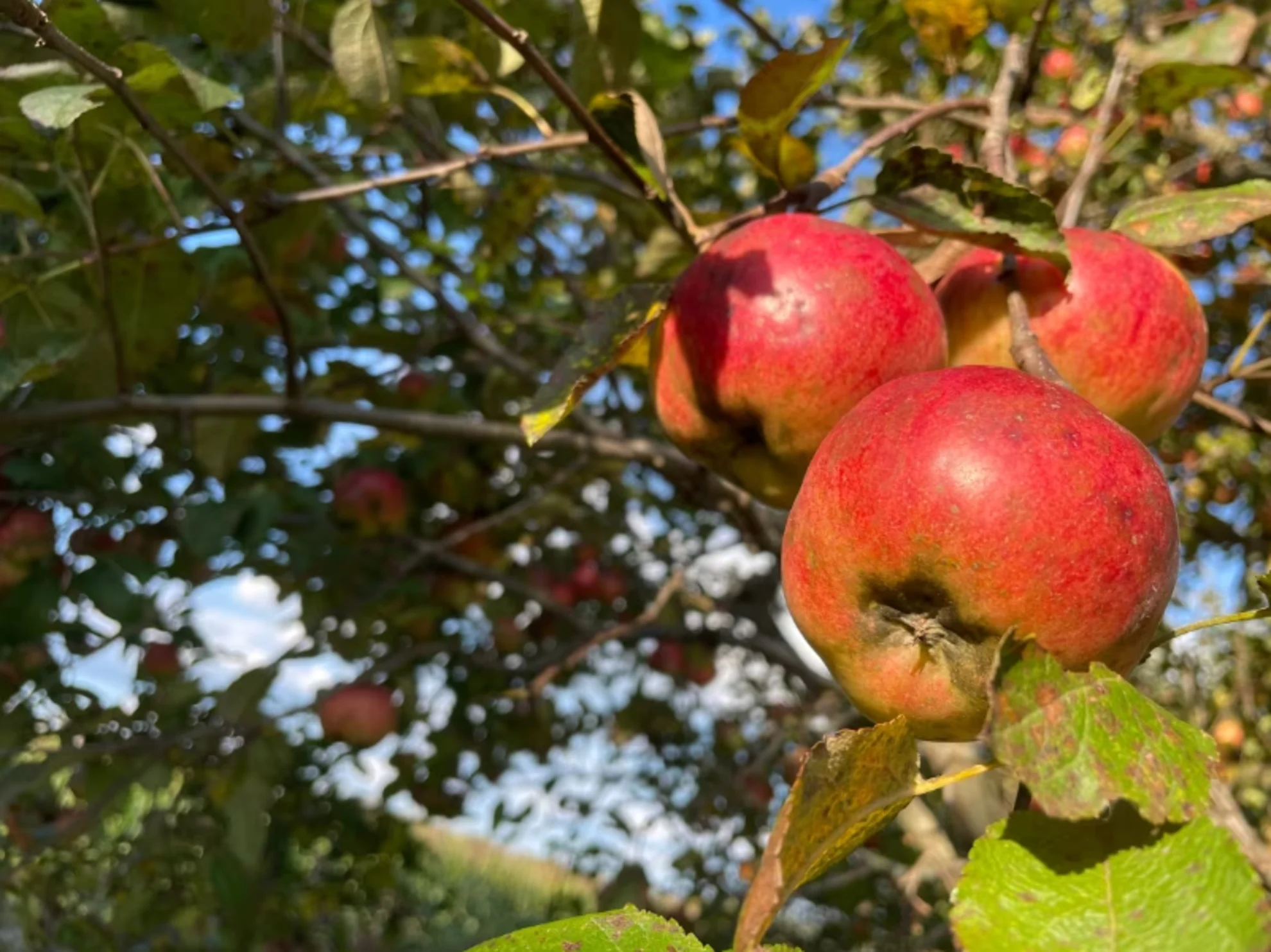
May frost puts chill on apple-picking season
Some eastern Ontario farms say a series of particularly cold nights in May have all but ruined their apple-picking season, forcing them to tell customers they may need to skip a cherished fall activity this year.
Michel Villeneuve's farm in Clarence-Rockland would typically need about 100 apple trees to open the farm to the public. This year, only around 10 have borne fruit.
"With this, we're closed now for picking. We didn't open in the fall at all," said the owner of Les Vergers Villeneuve and Blueberry Farm.
"So that means what we do [with] the little we have is we pick [it] ourselves and transform it to make juice and wine," he said. "It means we're losing all the customers coming over."
He said the apples that have grown, while perfectly fine to eat, also aren't the best looking — covered in marks from the sun and rain. His pears and grapes were also affected.

Michel Villeneuve says three nights of frost back in May mean his farm is unable to host apple picking this year. (Joseph Tunney/CBC)
The problem, he said, is that frosty weather typically happens in April, before the fruit starts to bud. In May the farm saw three different nights with frost.
Ottawa's airport hit -3 C early the morning of May 18. Even frost-hardy crops get damaged when it's that cold, according to Ontario's agriculture ministry.
According to a report prepared for the province this year, the risk to the apple industry is considered "high" under climate change so far, with that expected to rise to "very high" by 2050 and stay there for the rest of the century no matter how much global emissions may drop.
The report said that extreme heat, precipitation and frost are all factors. Temperatures below -2.2 C take as much as 10 per cent off apple production if the buds have reached their pink stage and below -4.4 C, it can kill 90 per cent.
Ontario's apple crop averages about 0.25 million metric tonnes or 13.7 million bushels per year over nearly 14,000 acres, according to the report.

Villeneuve said roughly 5,000 people visited the farm last year. He called the loss two-fold, as many apple pickers visiting the farm will also buy wine or other products. (Joseph Tunney/CBC).
Villeneuve said it's the second bad year in a row for his apples, with last year's derecho also hitting the 16-hectare farm hard. More orchards struggled in 2021.
The loss is two-fold, he said, as apple picking also brings in customers who often buy wine or other products. Approximately 5,000 people visited the farm last year.
"With all of these things happening in the last two, three years, we've been really rethinking on how to operate," Villeneuve said.
"It's really affecting us. So we have to rely on things that are more durable."
He said much work has been done to diversify the crops on the small farm, which has been in his family for 120 years. While his apples suffer, Villeneuve said his blueberries are having a record year.
Orchard diversifying offerings
At Cannamore Orchard in Crysler, about 50 kilometres east of downtown Ottawa, they've gone ahead with apple picking this season but say they're working with half of what they're used to.
Co-owner Mat Kelly said apples only take up around two of the 24 hectares on the farm, with it having other ways to supplement the loss.
Still, he said the last couple of years have been a little harder than he would have liked.
"We are also looking in the future for what else we could do," Kelly said.
"So that if, again, we have a bad year for something that is one of our major crops or major incomes, then there is something else that [we] can sort of fall back on."

According to a report prepared for Ontario’s Ministry of Environment, Conservation and Parks, the risk to the province's apples is considered high. (Joseph Tunney/CBC)
According to Ontario Apple Growers, which represents about 200 farmers who grow more than four hectares, some areas experienced frost in the spring but it wasn't widespread across the province.
WATCH: Protect your plants from frost with the '3 Cs'
In fact, a spokesperson said sunny days and cool nights have been good for the maturation and colour of apples, leading to a good harvest in some regions.
Across the provincial border, Les Producteurs de pommes du Québec said some areas in that province were impacted, particularly in the nearby Montérégie region.
This article, written by Joseph Tunney, was originally published for CBC News.
Thumbnail image courtesy: Joseph Tunney/CBC.









